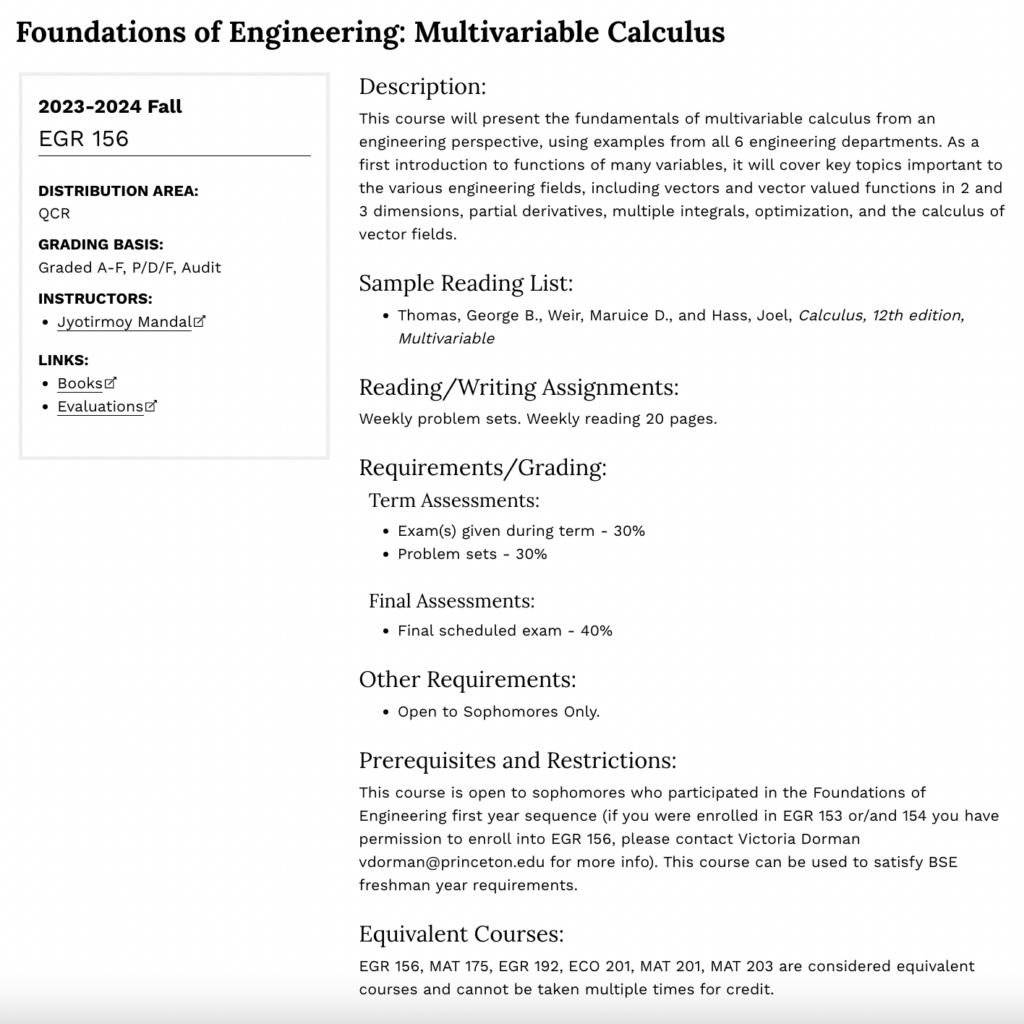After attending my final class of the semester, the feeling that I was done with my BSE requirements finally settled in. From now on, as a COS BSE major, I would have much more flexibility in my class options with my prerequisites complete. Having written both My BSE Fall Semester Experience in the Engineering Sequence and My BSE Spring Semester Experience in the Engineering Sequence (which I recommend you read first before reading this), I wanted to write a final article to reflect on my experience now that I’ve officially completed the Engineering Sequence. To reiterate one last time, the Engineering Sequence is a set of five courses intended to fulfill the engineering degree requirements through an introduction to engineering fundamentals in the context of real-world applications. BSE degree requirements include four semesters of math, two semesters of physics, one semester of chemistry, and every first-year student is required to take one semester of writing seminar and fulfill various distribution requirements for general degree requirements. This semester, I took the final course in the Engineering Sequence, Multivariable Calculus, which means that along with taking chemistry, I have completed my BSE degree requirements.

- EGR 156: Foundations of Engineering: Multivariable Calculus
EGR 156 is one of three courses eligible to fulfill the multivariable calculus BSE math requirements, the others being MAT 201: Multivariable Calculus and MAT 203: Advanced Vector Calculus. The course structure includes two weekly lectures and a precept, with weekly problem sets. Now that I have completed the Engineering Sequence, I find that both EGR 154, Foundations of Engineering: Linear Systems, and EGR 156 are both the least real-world application-based courses, as learning math in the context of solving real-world problems wasn’t the focus of the course. Comparatively, both of the physics courses had labs that allowed us to combine both real-world applicable technical skills and the concepts that we learned in class, and EGR152, the Calculus II equivalent, had highly conceptual problem sets and guest lectures. EGR 156 had very straightforward problem sets where we were expected to know how to solve problems based on what we learned in lecture, without any need to contextualize the problem in real world situations. EGR 156 is also the only course in the Engineering Sequence that has a precept, which I found helpful as it’s great for support and supplemental learning. Math and physics concepts can be hard to initially grasp, and I remember suggesting in my course feedback for EGR 152, that it would be helpful to have a precept. Moreover, this was the first course where it was textbook-based, meaning that the course material and problem sets were entirely derived from the textbook. I really enjoyed this aspect of the course because it felt that I had more autonomy in my own learning, in which I had the flexibility to reinforce my own knowledge where I felt was needed.
- Engineering Sequence Reflection
Coming into college, I had some prior knowledge of Calculus II and Physics Mechanics through high school courses, which meant that the Engineering Sequence could be a good alternative for me compared to the more generally taken Math and Physics Sequence. My favorite aspects from the Engineering Sequence was definitely the EGR 151 physics lab due to its project-based nature as well as the guest lectures in EGR 152. I find that after the first semester of the Engineering Sequence, the real-world application of the sequence is very minimal. However, I still found the Engineering Sequence to be a great alternative to fulfill BSE degree requirements because there are fewer people taking the courses, meaning that there is more opportunity to form bonds with peers which is important as many found that forming problem set groups was very helpful. If you would like to know more about whether you are well-suited to take the Engineering Sequence, I would read my previous articles and consult resources such as your peer academic adviser, residential college deans, and academic advisers.
I’m glad I took the Engineering Sequence, and I hope my articles provided you with more direction or insight! Wishing you the best!
— Shannon Yeow, Engineering Correspondent

